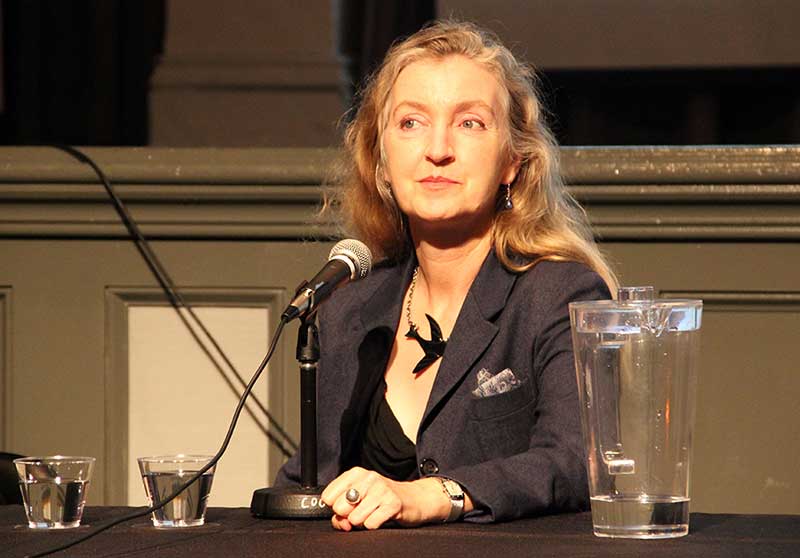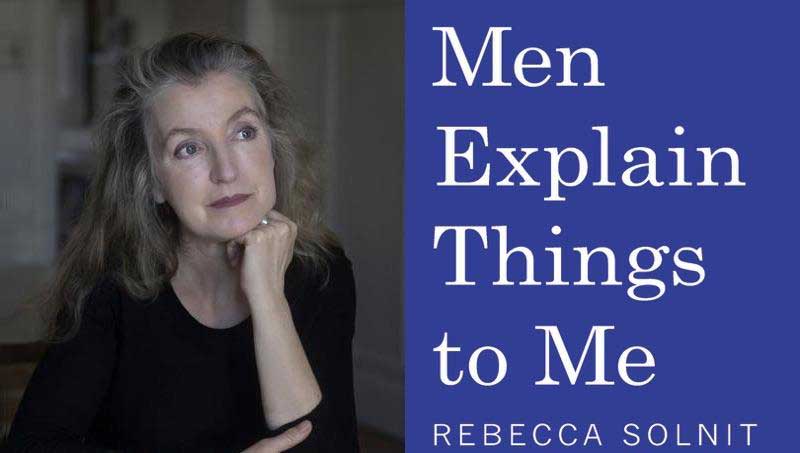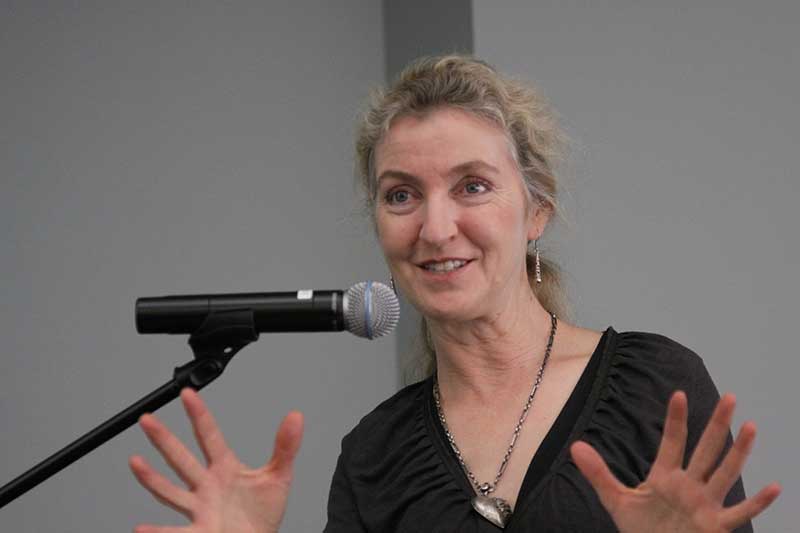- Hope In The Dark, Rebecca Solnit, Books & Quotes
- Rebecca Solnit Men Explain Things To Me

- 9 July '18


by Robert McIntosh
9 July '18Hope In The Dark, Rebecca Solnit, Books & Quotes
"Violence doesn’t have a race, a class, a religion, or a nationality, but it does have a gender." Rebecca Solnit, Men Explain things to me. (2014)
Rebecca Solnit - Bio
Rebecca Solnit was born in Bridgeport Connecticut in 1961 and in 1966 moved with her family to Novato California (Bay area) where she grew up. Solnit has mostly lived in the Bay area for the balance of her life, and has lived in San Francisco for all of her writing careers and also, university education.
Background
Solnit has described a family background that included violence, and that her troubled youth and need to escape, were significantly tied to childhood difficulties. In terms of details, Solnit is deliberately vague and notes that the privacy of her siblings is an important value that she respects and wants to maintain. Therefore, although she explicitly raises the issue of family violence, there is no indication of specifics. Her parents had mixed heritage, and her father was Jewish and her mother was from an Irish Catholic background.
Political activist
For as long as she has worked as a writer or since the late 1980s, Solnit has also been engaged with social activism. She has committed time to organizations connected to environmental issues, and social/political justice -- these are likewise, recurring causes that are implicitly and explicitly expressed as themes in her writing.
Awards and recognition
In terms of awards and recognition, in 2013 her work The Faraway Nearby was nominated for a National Book Award and also on the shortlist for the National Book Critics Circle Award. In 2004, her work titled For River of Shadows received the Harvard's Mark Lynton History Prize, the National Book Critics Circle Award in Criticism, the Sally Hacker Prize from the Society for the History of Technology. She has received a Guggenheim Fellowship, several National Endowment for the Arts fellowships and a Lannan literary fellowship. To date, she has written twenty books and hundreds of articles.

Progressive writer
Her first main work is in some respects the most stylistically conventional. In 1990, her work titled: Secret Exhibition: Six California Artists of the Cold War Era was published by City Lights in San Francisco. City Lights is known as one of the most progressive or leftist publishers in the US, and they did much to draw attention to Solnit as an emerging writer. Their reputation and readership are significant given that they have for decades published some of the best-known writers in the US including Lawrence Ferlinghetti, Allen Ginsberg, Noam Chomsky, and Howard Zinn. First of Rebecca Solnit books concerned six artists through the 1950s and 1960s or the Cold War period when any left thinking individuals were regarded as potentially subversive. In the arts and academic communities, the practice of self-censorship was common in terms of politics because of the open persecution of communist intellectuals of that era. The book contains over 100 illustrations and features six California based artists: Wally Hedrick, Wallace Berman, Bruce Conner, Jay DeFeo, Jess, and George Herms. All of these figures are modern abstract or mixed media artists, and all of them challenged the political ideology of the era. However, she argues that the challenge itself was subtle and intentionally so. It was a dangerous period for artists, and Solnit's focus broadens the context of the politics and culture of the period of the Cold War. She further draws many parallels with the contemporary world. The work was critically well-received, and it solidified Solnit as a left-leaning or progressive writer.
Savage Dreams
Next Rebecca Solnit book was Savage Dreams (1993). This book looked at the history of Yosemite National Park and the Nevada Nuclear Test site. Both institutions and regions were settled by removing the indigenous people from their lands.
Indigenous Americans
The rights of indigenous Americans has been a long time social cause of Solnit on a personal plateau.
A Book of Migrations
Her next work titled A Book of Migrations: Some Passages in Ireland (1997) examines the history of Ireland and parallels this to the colonization and annexation of the US West. She covers a millennium's worth of history and argues that the history of Ireland is inseparable from the violent colonial expansion that established European nations as the dominant force worldwide. The subjugation of the Irish was extended to the colonies and became a defining feature of the British Empire in the colonial period. Following this work, two works on walking and its value on perspective solidified Solnit as a stylist. Both works look at how accidental encounters create a meaningful experience. That is, how walking and encountering the world on its terms as opposed to a top-down travel itinerary or agenda, aids in the change and challenge of personal perspective.
In the process of seeing the world without a plan, diversions happen when interests are stimulated. She argues that this is a process that helps challenge the narratives that predefined a place or region, and in turn, this challenge creates the possibility of newer narratives. That is narratives that are born from the very challenge to the dominant ideology. This form of a personal challenge is a key element in Solnit's later writing, and it is a form of protest which she thinks can create wider amounts of subversion. Further, it is a form of protest that represents hope and optimism in terms of creating unconsidered possibilities for political action and change. This form of personal perspective as a challenge warrants a closer examination, and it is a form of communication that is central to her best-known work, Men explain things to me (2014).

Men explain things to me
Rebecca Solnit is probably best known for her concept of 'mansplaining'. This is a term that has become adopted widely. Her full monograph (2014) on the topic, is the expansion and development of an essay on this subject that was initially published in 2009.
Mansplaining
The notion of mansplaining emerges at the outset of her book and essay in the form of a personal anecdote. Solnit describes attending a party where the host begins to describe the contents of a book that he had just read a review about. Solnit is talking with the host with a mutual friend who keeps trying to interrupt his monologue by pointing out that the author of the book he is talking about is standing in front of him. Solnit further points to the fact that the host was so engrossed and oblivious, that he completely ignored the several comments made by the mutual friend about Solnit being the author. He was speaking above both of the women he was standing with. In turn, when he finally does get the message and recognizes that Solnit is the topic of his monologue, he only continues to explain the book.
Act of violence
This erasing is an act of violence. There is a sensationalist element to the chapter in that it is completely unrelenting in terms of the deluge of facts and incidents that she describes rape cases. She describes the global prevalence and details cases of violent gang rapes and openly public sexual assaults. The deluge within the wider book, punctuates the line of continuity between a seemingly benign 'mansplaining' to murder: "Rape and other acts of violence, up to and including murder, as well as threats of violence, constitute the barrage some men lay down as they attempt to control some women, and fear of that violence limits most women in ways they’ve gotten so used to they hardly notice - and we hardly address ... Mostly, however, we don’t talk about it" (Solnit 2014 Ebook).
Suppression
Solnit is extreme in this chapter, and continually evocative in order to challenge some of the fears that make people naturally or instinctively look away.

Universal trends
Solnit's style and presentation run the risk of creating universal truths or just universal trends, from singular and particular instances. By integrating herself and her on-the-ground perspective, there is the appearance that there are implausible leaps or liberties taken. In short, generalizations that are made from subjective observation can potentially be solipsistic. However, she is working in reverse. Her engagement is about her response to the other, rather than her projection of herself onto the subject/object of study and analysis. By this, an analogy from a well-worn cliche about seeing a forest through the trees might serve to demonstrate a point about her approach. When an individual goes to a forest or a national park they will only encounter and engage with particular natural objects. Not a single object that can or could be detected by human senses is the forest or a forest. Rather, there are particular trees, rocks, animals and so forth. One is in a state of being in a forest, but there is no actual evidence of it. There are only particular instances and singular objects that can be defined as a species of some natural kind. For Solnit, the engagement with the particular is how the objective or the universal reals itself to define and en-frame it. A forest is really a human boundary, but so too are many of the social and political ideas that are held as universal or universally true.It will be recalled that she is deliberately secretive about her past and her own biography. It is also the case that she is consistent with this withholding in her writing in terms of the subjective perspectives and interjections of personal narrative. Her writing can be described as a particular reaction or response to a universe that is imposed from above. However, it is the truth of the particular that can change the path of the universal, and in this form of change functions as a deconstruction.

